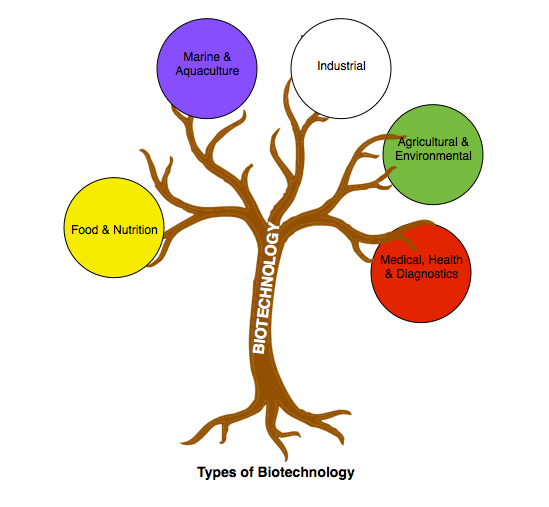Types of Biotechnology

Biotechnology encompasses a wide range of applications that utilize biological systems, organisms, or derivatives to develop products and technologies for various purposes. Here are some common types of biotechnology:
-
Medical Biotechnology:
- Medical biotechnology focuses on using biological processes and organisms to develop pharmaceuticals, diagnostic tests, and medical devices.
- Examples include the production of vaccines, monoclonal antibodies, gene therapies, and diagnostic tests for diseases.
-
Agricultural Biotechnology:
- Agricultural biotechnology involves the use of genetic engineering, molecular breeding, and other biotechnological techniques to improve crop plants, livestock, and agricultural practices.
- Examples include the development of genetically modified (GM) crops with enhanced resistance to pests, diseases, and environmental stresses, as well as the production of genetically engineered animals for agriculture.
-
Industrial Biotechnology:
- Industrial biotechnology focuses on using biological systems and processes to produce chemicals, materials, and energy.
- Examples include the production of biofuels (e.g., ethanol, biodiesel) from renewable biomass sources, biodegradable plastics, enzymes for industrial processes (e.g., textile manufacturing, paper production), and bioremediation of environmental pollutants.
-
Environmental Biotechnology:
- Environmental biotechnology involves the use of biological processes and organisms to address environmental challenges, such as pollution control, waste treatment, and resource conservation.
- Examples include bioremediation of contaminated soil and water using microorganisms, wastewater treatment using biological processes (e.g., activated sludge, bioreactors), and the development of bio-based alternatives to conventional materials and fuels.
-
Food Biotechnology:
- Food biotechnology focuses on using biotechnological techniques to improve the safety, quality, and nutritional value of food products.
- Examples include the development of genetically modified (GM) crops with enhanced nutritional content or reduced allergenicity, fermentation processes for food production (e.g., cheese, yogurt, beer), and the use of enzymes and microorganisms in food processing.
-
Biopharmaceuticals:
- Biopharmaceuticals are therapeutic products derived from biological sources, such as proteins, peptides, antibodies, and nucleic acids.
- Examples include recombinant protein drugs (e.g., insulin, growth hormones), monoclonal antibodies for cancer therapy, gene therapies, and cell-based therapies (e.g., stem cell therapies).
-
Regenerative Medicine:
- Regenerative medicine focuses on restoring or replacing damaged tissues and organs using biological materials, cells, or engineered tissues.
- Examples include tissue engineering to create artificial organs and tissues for transplantation, stem cell therapies for regenerating damaged tissues, and gene editing techniques for correcting genetic disorders.
These are just a few examples of the diverse applications of biotechnology across different sectors. Biotechnology continues to advance rapidly, with ongoing research and development leading to new innovations and applications that address societal challenges and improve human health, agriculture, industry, and the environment.
Thank you,
